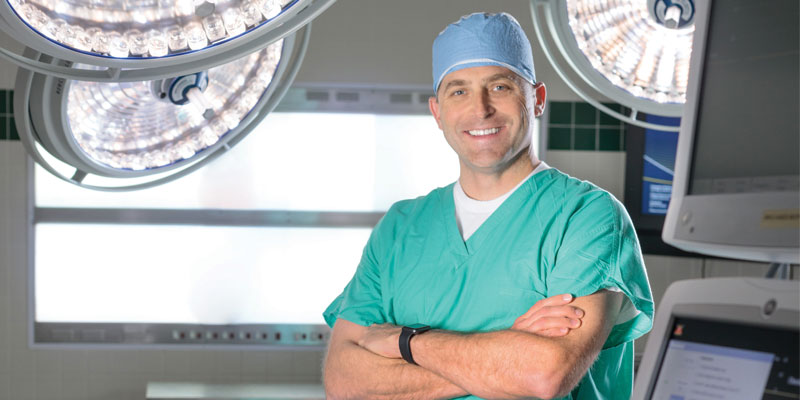2017 Fall

Revolutionary Approach to Mitral Regurgitation Under Study
The tools and techniques available to treat mitral valve disease are rapidly changing. Most recently, an innovative device called the NeoChord DS1000 system has been developed that combines the best of both open and percutaneous procedures for a unique approach to mitral valve repair.
Under an Investigational Device Exemption, MedStar Washington Hospital Center is one of only 20 sites in the United States, Canada and Europe selected for the RECHORD clinical trial, which aims to answer two key questions: Is NeoChord equally as effective as open surgery? And is it safer, reducing the risk of stroke and other complications?
Findings could influence the trajectory of mitral valve repair.
“NeoChord is in a class all its own, and quite possibly the wave of the future,” says cardiac surgeon Christian Shults, MD, principal investigator for the hospital’s trial. Dr. Shults trained on the device’s use in Europe, where it received its CE mark in 2013. “There’s no opening of the heart, no sternotomy, no heart/lung machine. Instead, we approach the beating heart through a small incision between the ribs, allowing us to perform a mitral valve repair under physiologic conditions without opening the chest or stopping the heart.”
During the procedure, the surgeon introduces the NeoChord system through the apex of the left ventricle and navigates to the mitral valve under 3D transesophageal echo guidance. A small, jaw-like device captures the prolapsed portion of the leaflet and places a stitch in the leading edge. The stitch is then brought out the apical incision along with the device. Next, the surgeon manipulates the new chordae under real-time imaging to achieve the tightest seal and reduce regurgitation.
Once dynamic feedback confirms the most effective tension, the chordae are secured to the apex of the heart and the hole sutured.
Based on experiences with more than 500 cases in Europe, the procedure takes one to two hours, with a relatively quick recovery. Without a sternotomy and the attendant restrictions associated with open heart surgery, most patients resume normal activities within a week. A recent clinical data report from the University of Padua also showed sustained outcomes comparable to open mitral valve repair at the two-year mark.
“This is a potential game changer for mitral valve therapy,” says Dr. Shults, “and could make the case for earlier intervention in asymptomatic patients with severe mitral regurgitation.”
NeoChord Trial Seeks Candidates
MedStar Washington Hospital Center is one of the first in the United States to begin the randomized NeoChord trial and the only one in the area. The multicenter, prospective pivotal study hopes to enroll up to 585 patients with degenerative mitral regurgitation from ruptured or elongated chordae over a two-year period.
Trial candidates must be eligible for open surgery and free from other coronary disease or renal failure. A limited number of non-randomized study slots are reserved for high-risk, non-surgical candidates who will automatically be treated with NeoChord. Other criteria apply.









